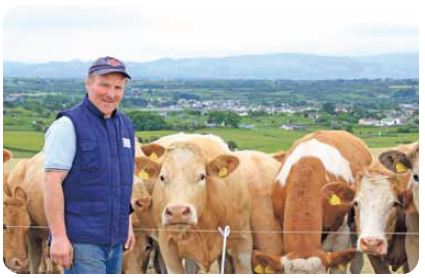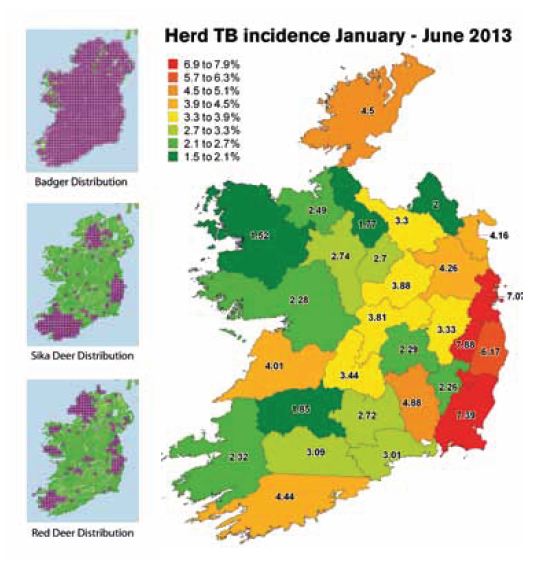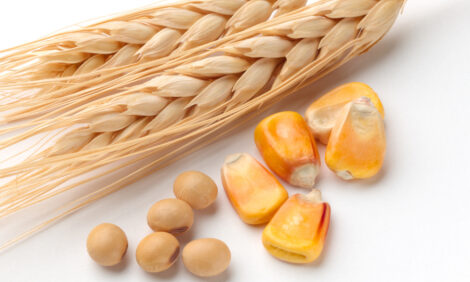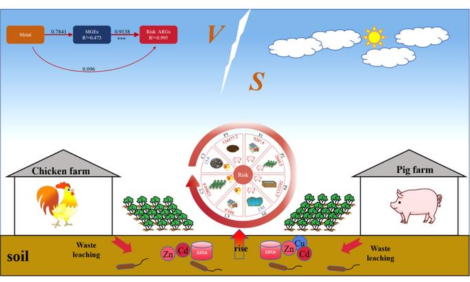



Bovine Tuberculosis: Vaccinate or Cull, Badgers or Deer?
Ireland's improving bovine tuberculosis picture is hampered by isolated pockets of wild deer populations, writes one of the country's leading livestock policy experts.Here in the Ireland, the TB-related control of badgers has been ongoing for many years, and in the main, herd incidence of bovine TB has steadily fallen year-on-year, says the Irish Cattle and Sheep Farmers Association's (ICSA) Geoff Hamilton.
Since 2000, the number of reactors has fallen from 39,847 to 18,476 in 2012, writes the ISCA Policy Officer.
In an effort to further reduce the impact of ‘wildlife reservoir’ TB, the Department of Agriculture has recently embarked on a series of field trials investigating the efficacy of TB vaccination for badgers, where animals are trapped, sedated and orally dispensed a vaccine dose; this research aims to inform whether a more extensive programme can be rolled out using vaccine-containing bait and reduce or eliminate the need for future culling of badgers.

Some of these 4-year trials in parts of Louth, Monaghan, Galway, Longford, Tipperary, Cork and Waterford are already underway, with the rest to begin in 2014. ICSA wish to remind farmers that badgers remain a protected species and can only be controlled by dedicated staff operating under strict licensing conditions controlled by the National parks and Wildlife Service.
The killing of badgers or any disturbance of a sett without license is an offence punishable under the Wildlife Act.
Other Factors in Localised TB Hotspots
ICSA welcomes the ongoing efforts being made by the Department to working towards the eventual elimination of bovine TB in the country but wishes to highlight concerns over a one-sizefits- all approach.
As an example, while badger culling can definitely be related to the overall national reduction in bovine TB incidence, there still exist localised areas where TB remains a significant problem, despite ongoing badger control.
Anecdotal evidence from farmers in these areas (such as East Wicklow and South Donegal) suggests that deer could potentially be part of the problem, particularly where large populations can build up in commercial forestry plantations.
The Department’s stated position is that deer are not a significant problem, and that infected deer are a product of badger and cattle infection, not a cause of it.
However, the in deer populations are found. ICSA has a number of meetings scheduled with Department representatives in the near future, and will be highlighting this issue as part of any future TB management policy being drafted by the Government.
ICSA Rural Development Chairman John Barron said, “While the national reduction in herd TB incidence is to be welcomed, more needs to be done by the Department in response to localised TB hotspots”.
And Abroad
UK Badger Cull Trials - There has been considerable (and occasionally sensational) media coverage in recent weeks in relation to the start of badger culling in the southwest of England.
The six-week culling trial operated by trained and licensed marksmen, which is to take place in parts of Somerset and Gloucestershire, aims to remove up to 5,000 badgers (50 animals per day).
The trials are being carried out in these regions (where there are a high number of TB infections in cattle) to assess whether badgers can be culled humanely, safely and effectively. England, unlike Ireland, has not operated an ongoing programme of badger control in the past few decades.
Since the 1980s, the numerical incidence of TB in cattle in England has increased exponentially and the disease has spread geographically outwards from its original concentration in southwest England.
The English trials will not aim to assess to what degree bovine TB infection can be reduced, but simply seek to establish how humane this specific badger culling approach is, how efficient is the shooting methodology and if there is a public safety issue to be addressed. Results of the trial will inform UK Ministers on any plans to extend the culling pilot to other parts of England.
Alternative UK TB management models
Meanwhile, the Welsh Assembly Government has taken a completely alternative approach and has chosen to vaccinate badgers via a BCG injection, with trials underway in North Pembrokeshire; the cost of vaccinating a single badger is put at £662.
In Northern Ireland, final preparations are being made for a pilot control scheme in two areas of County Down where badgers are to be captured, vaccinated and released if healthy, and destroyed if found to be infected with TB.



